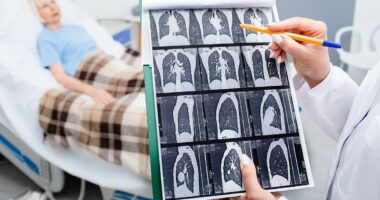Share this @internewscast.com
Many of us overlook symptoms we’re experiencing as we tell ourselves it can’t be serious. However, getting checked out could save your life.
In an effort to alert others to potential warning signs, a young man is recounting his experience after being diagnosed with stage 4 non-Hodgkin lymphoma at the age of 21.
Non-Hodgkin lymphoma, also known as cancer of the lymphatic system, is a type of blood cancer that affects white blood cells.
One common indication of this condition is a painless swelling in a lymph node, yet there are additional signs that often go unnoticed. These symptoms include night sweats, unintended weight loss, a high fever, shortness of breath, and persistent itching.
These warning signs are frequently disregarded, as they can be confused with effects of stress or fatigue, but they may actually signal a far more serious issue.
On his @ChemoPump TikTok page, the cancer patient described his journey.
The 22-year-old, from New Jersey in the US, noted he would often get a runny nose, chronic neck and back pain and kept “throwing up for no reason”.
Additionally, he suffered from extreme fatigue, severe stomach pain, diarrhea, and wobbly knees. These symptoms were intense and unusual, indicating it was time to consult a physician.
Despite these symptoms, the young man was diagnosed only after he visited the hospital due to stomach pain. It was during this hospital visit that they discovered a “5cm mass” in his colon, which could be cancerous.
A petscan and colonoscopy confirmed the heartbreaking news – he had stage 4 non-Hodgkin lymphoma.
The young man went through eight rounds of chemotherapy and is now cancer free. He hopes sharing his story will help others.
He said: “As hard as this has been, this experience has changed me forever. I hope I can inspire you. Keep fighting.”
If you are experiencing symptoms associated with cancer, it is crucial to see a general practitioner. The NHS also advises scheduling a visit if swollen glands persist beyond six weeks.
It adds: “While these symptoms are unlikely to be caused by non-Hodgkin lymphoma, it’s best to get them checked out.”














